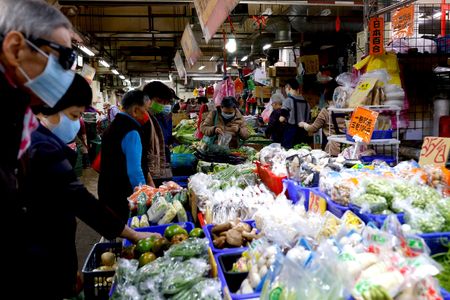 1
1 1
1
By Jeanny Kao and Faith Hung
TAIPEI (Reuters) -Taiwan’s export-dependent economy contracted more than expected in the first quarter and slipped into recession as exports were hit by slowing global tech demand and broader economic woes, but should hit a 2% growth target this year.
Gross domestic product (GDP) shrank 3.02% in January-March from a year earlier, following a contraction of 0.41% in the previous quarter, preliminary data from the statistics agency showed on Friday.
That marked the economy’s worst performance since 2009 and lagged a fall of 1.25% predicted in a Reuters poll.
“The first-quarter GDP was the worst since the financial crisis,” Wu Pei-hsuan from the Directorate General of Budget, Accounting and Statistics told reporters, referring to the 2008-2009 global crisis.
“This quarter’s external demand was weak, but private consumption was strong.”
There is still a chance, though, for the 2023 full-year GDP to hit 2% growth, the statistics department said.
Taiwan’s exports fell year-on-year for a seventh consecutive month in March, with the government predicting the downturn may continue until at least the fourth quarter.
Economy Minister Wang Mei-hua told reporters there were no “obvious signs of recovery” for the global economy due to high inflation and high interest rates, and Taiwanese companies were still seeing high levels of inventory.
“Everyone hopes things improve in the second half,” she said.
Taiwan’s first-quarter exports dropped 19.17% from a year earlier in U.S. dollar terms, the agency said.
Quarter-on-quarter, the economy contracted 6.37% on a seasonally adjusted annual rate.
The economy in China, Taiwan’s largest export market, grew 4.5% in the first quarter on the year, faster than expected as the end of strict COVID-19 curbs freed businesses and consumers from crippling disruptions.
Taiwan will release revised GDP figures for the first quarter in late May, which will include full-year growth forecasts for 2023. In February, the statistics agency revised down its full-year 2023 outlook to +2.12% from a previous forecast of +2.75%.
That would signal a slowdown from expansion of 2.45% in 2022 and 6.53% in 2021.
(Reporting by Jeanny Kao and Faith Hung; Editing by Ben Blanchard, Simon Cameron-Moore and Raju Gopalakrishnan)